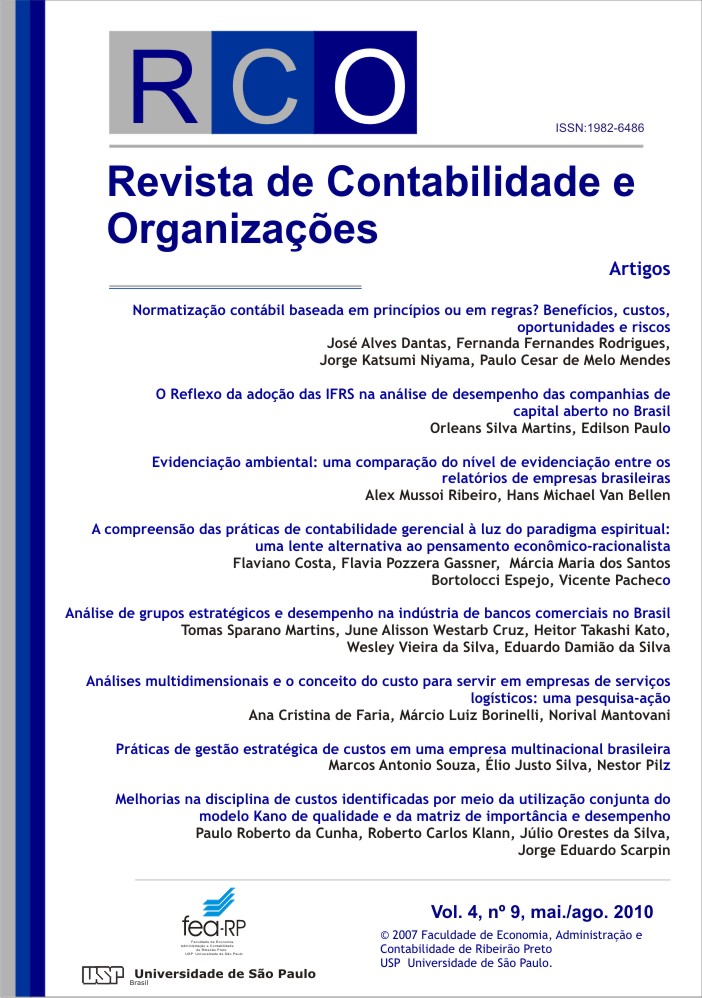Análise de grupos estratégicos e desempenho na indústria de bancos comerciais no brasil
DOI:
https://doi.org/10.11606/rco.v4i9.34769Palavras-chave:
Bancos Comerciais, Grupos Estratégicos e Desempenho, Commercial Banks, Strategic Groups, PerformanceResumo
O objetivo do presente trabalho é identificar a relação entre grupos estratégicos e desempenho na indústria de bancos comerciais no Brasil. Para cumprir esse propósito, foi realizado um estudo no setor, de janeiro a dezembro de 2007, com uma amostra não probabilística de 28 bancos, por meio da análise fatorial, da análise de cluster e da comparação descritiva de médias. A análise cluster indicou a presença de quatro grupos estratégicos: um grupo formado por 22 bancos (Grupo 1); outro formado pelos dois maiores bancos comerciais do Brasil (Grupo 2); um formado somente pelo Banco do Brasil (Grupo 3); e um formado por três bancos comerciais privados (Grupo 4). Pôde-se verificar que o Grupo 2 buscou uma estratégia baseada em seus recursos financeiros, o que lhe permitiu adotar uma estratégia de posicionamento relacionada a custo. O Grupo 3 adotou uma estratégia baseada em diversidade e qualidade de produtos, com atuação geográfica ampla. O Grupo 4, uma estratégia de diferenciação com uma amplitude geográfica relativamente alta. Com base nos indicadores de desempenho ROA e pelo ROE, o Grupo 2 (Itaú e Bradesco) apresentou um desempenho superior em retorno sobre ativos e o Banco do Brasil (Grupo 3), em retorno sobre o patrimônio líquido.Downloads
Publicado
Edição
Seção
Licença
A RCO adota a política de Acesso Livre (Libre Open Access), sob o acordo padrão Creative Commons (CC BY-NC-ND 4.0). O acordo prevê que:
- A submissão de texto autoriza sua publicação e implica compromisso de que o mesmo material não esteja sendo submetido a outro periódico. O original é considerado definitivo;
- Autores mantêm os direitos autorais e concedem à revista o direito de primeira publicação, com o trabalho simultaneamente licenciado sob a Licença Creative Commons Attributionque permite o compartilhamento do trabalho com reconhecimento da autoria e publicação inicial nesta revista;
- Autores têm autorização para assumir contratos adicionais separadamente, para distribuição não-exclusiva da versão do trabalho publicada nesta revista (ex.: publicar em repositório institucional ou como capítulo de livro), com necessário reconhecimento de autoria e publicação inicial nesta revista;
- Autores têm permissão e são estimulados a publicar e distribuir seu trabalho online (ex.: em repositórios institucionais ou na sua página pessoal) antes ou durante o processo editorial, já que isso pode gerar alterações produtivas, bem como aumentar o impacto e a citação do trabalho publicado (Veja O Efeito do Acesso Livre);
- A revista não paga direitos autorais aos autores dos textos publicados;
- O detentor dos direitos autorais da revista, exceto os já acordados no acordo de Libre Open Access (CC BY-NC-ND 4.0), é o Departamento de Contabilidade da Faculdade de Economia, Administração e Contabilidade de Ribeirão Preto da Universidade de São Paulo.
Não são cobradas taxas de submissão ou de publicação.
São aceitos até 4 autores por artigo. Casos excepcionais devidamente justificados poderão ser analisados pelo Comitê Executivo da RCO. São considerados casos excepcionais: projetos multi-institucionais; manuscritos resultantes da colaboração de grupos de pesquisa; ou que envolvam grandes equipes para coleta de evidências, construção de dados primários e experimentos comparados.
É recomendada a ordem de autoria por contribuição, de cada um dos indivíduos listados como autores, especialmente no desenho e planejamento do projeto de pesquisa, na obtenção ou análise e interpretação de dados e redação. Os autores devem declarar as efetivas contribuições de cada autor, preenchendo a carta ao editor, logo no início da submissão, responsabilizando-se pelas informações dadas.
É permitida a troca de autores durante todo o processo de avaliação e, antes da publicação do manuscrito. Os autores devem indicar a composição e ordem final de autoria no documento assinado por todos os envolvidos no aceite para publicação. Caso a composição e ordem de autoria seja diferente da informada anteriormente no sistema, todos autores anteriormente listados deverão se manifestar favoráveis.
No caso de identificação de autoria sem mérito ou contribuição (ghost, guest or gift authorship), a RCO segue o procedimento recomendado pela COPE.








